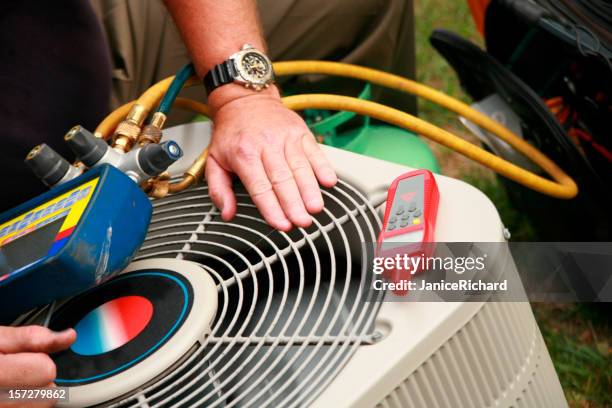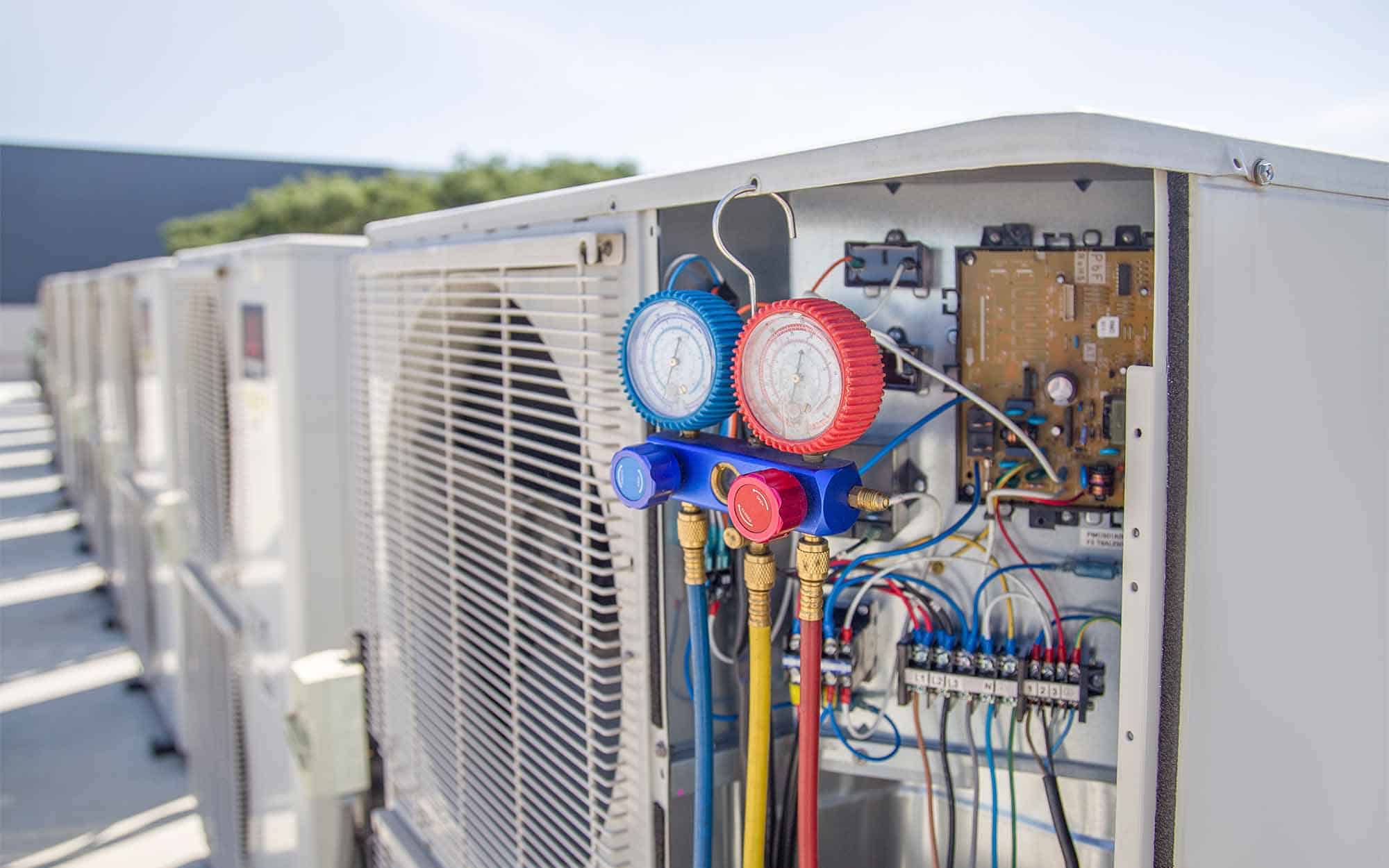Choosing the Right Model for heat pump installation ooltewah tn
Picking In Between a Heat Pump and Furnace: Secret Factors To Consider for Your HVAC Demands
When evaluating home heating alternatives for a/c needs, the decision in between a heatpump and a furnace can be complex. Each system supplies distinctive benefits tailored to specific environments and energy effectiveness goals. Recognizing these distinctions is essential for making an enlightened option. Key aspects such as setup costs and ecological effect even more make complex the option procedure. Which option really lines up with one's comfort and sustainability choices? The adhering to sections will certainly explore these factors to consider thoroughly.
Recognizing Warm Pumps: How They Work and Their Benefits
While lots of property owners think about numerous heating alternatives, recognizing exactly how heatpump feature and their advantages can substantially influence their choice. Warmth pumps operate by moving heat rather than producing it. In the winter, they draw out warm from the outdoors air or ground and transfer it inside your home, while in the summertime, they reverse this process, cooling the home by eliminating warmth outside. This double capability makes them versatile for year-round environment control.One of the primary advantages of heatpump is their power efficiency. They use significantly much less power compared to typical furnace, possibly resulting in reduced energy costs (ductless mini splits). Furthermore, warmth pumps have a smaller sized carbon footprint, making them an ecologically friendly option. They likewise need much less maintenance than conventional systems, adding to long-lasting cost financial savings. Overall, understanding the auto mechanics and advantages of warm pumps can assist house owners make informed decisions concerning their home heating and cooling down demands
Discovering Heaters: Types, Operation, and Advantages
Furnaces can be found in numerous kinds, including gas, electric, and oil models, each with distinct operational systems. Understanding these distinctions is crucial, as they affect efficiency and home heating performance. Additionally, heaters supply numerous benefits, such as consistent warm result and dependability in cooler climates.
Kinds of Furnaces
Heating systems can vary significantly in design and procedure, with furnaces being a prominent option among house owners. There are numerous types of furnaces, each making use of different gas sources and modern technologies. Gas heaters are typical, leveraging gas to create heat successfully. Electric heating systems, on the other hand, make use of electric resistance to create heat, commonly favored for their uncomplicated installation. Oil heaters, while less typical, are efficient in areas with minimal gas access (ductless mini splits). Furthermore, condensing heaters optimize energy performance by reusing and catching exhaust gases. Each kind operates via a system of heat exchangers and ductwork to disperse cozy air throughout a home. Comprehending the differences between these heating system kinds is necessary for informed a/c choices
Benefits of Heaters
For homeowners seeking reliable warmth during chilly months, the advantages of heating systems are substantial. Furnaces supply consistent heating, making certain even temperatures throughout the home. They are especially reliable in severe cool, typically outperforming warm pumps in icy problems. Different kinds, consisting of gas, electrical, and oil furnaces, provide versatility to satisfy varied demands and preferences.Furnaces likewise tend to have lower preliminary installment prices compared to heatpump, making them an extra accessible option for numerous. Their robust design adds to a longer lifespan, with many units lasting over 15 years with proper maintenance. Furthermore, contemporary heating systems are commonly outfitted with innovative modern technology for improved efficiency, which can result in decreased energy expenses. Overall, furnaces continue to be a reputable selection for reliable home heating.

Power Effectiveness: Contrasting Heat Pumps and Furnaces
When comparing power efficiency in between heatpump and heating systems, the Seasonal Power Efficiency Proportion (SEER) plays an essential function in establishing performance. Furthermore, an operational expense evaluation exposes the long-lasting economic implications of each system. Comprehending these variables can lead house owners in making educated choices about their heating options.
Seasonal Power Performance Ratio
Energy effectiveness plays a crucial function in the decision-making procedure between heatpump and heating systems, specifically when considering the Seasonal Energy Efficiency Ratio (SEER) This metric steps the cooling performance of heatpump over an entire cooling period, offering a standardized means to evaluate performance. Greater SEER rankings show better power performance, converting to reduced power usage and decreased utility bills. On the other hand, furnaces are typically evaluated utilizing the Yearly Fuel Utilization Performance (AFUE) score, which mirrors home heating effectiveness. When comparing these two systems, property owners ought to prioritize SEER scores for heatpump, as they directly effect total energy financial savings and environmental sustainability. A detailed understanding of SEER can especially affect the lasting satisfaction and cost-effectiveness of the picked a/c service.
Operational Price Evaluation
Understanding the functional costs connected with warmth pumps and heating systems is crucial for house owners assessing their options. Warmth pumps typically use higher energy efficiency, transforming electrical power right into heat with very little waste. This leads to reduced regular monthly energy bills, especially in modest environments. On the other hand, conventional furnaces, specifically gas models, might have reduced in advance costs however can incur higher functional expenses in time because of sustain costs and performance ratings.Moreover, warm pumps can operate as both home heating and cooling down systems, potentially minimizing the demand for separate cooling and heating units. While first investments for heatpump might be greater, their long-lasting cost savings in power efficiency can make them an extra affordable selection for many families. Mindful analysis of local energy prices is vital to figure out the most effective choice.
Installment Prices: What to Anticipate for every Furnace
Installment prices for heater can vary significantly in between warmth pumps and heaters, influencing homeowners' decisions. Heat pumps normally have higher ahead of time setup prices, typically ranging from $3,500 to $8,000, relying on the system dimension and complexity of installation. This includes the outside unit, interior handling system, and required ductwork alterations. On the other hand, furnaces tend to have lower initial costs, averaging in between $2,500 and $6,000, which can be appealing for budget-conscious homeowners. However, installation expenditures can raise if extensive ductwork is required.Moreover, the choice of fuel type for furnaces-- gas, propane, or electric-- can likewise impact installation prices. While heat pumps offer energy efficiency, their first financial investment may deter some customers. Eventually, reviewing setup costs along with lasting cost savings and efficiency will help property owners in making notified choices concerning their heater.
Climate Considerations: Which System Does Much Better in Your Location
How do environment conditions affect the efficiency of home heating systems? The efficiency of heat pumps and heaters can vary considerably depending upon the local environment. In moderate climates, heatpump excel by successfully transferring heat from the outside air, making them an energy-saving alternative. Their performance decreases in very chilly temperatures, where they might have a hard time to draw out sufficient warmth. Conversely, heaters, specifically gas designs, give reliable and regular heat no matter of exterior index conditions, making them better in cooler regions.In locations that experience milder wintertimes, heatpump can run effectively year-round, providing both home heating and air conditioning. In contrast, areas with rough winter seasons usually gain from the effectiveness of furnaces. Eventually, recognizing the neighborhood climate is vital when making a decision between a heatpump and a heating system, as it directly impacts their functional efficiency and overall efficiency.
Maintenance Needs: Long-Term Care for Warmth Pumps vs. Furnaces
While both warmth pumps and heaters require normal maintenance to assure peak efficiency, their specific needs and care regimens differ substantially. Heaters typically require much less constant interest, with yearly inspections sufficing to inspect for gas leakages, clean filters, and evaluate total capability. Their less complex design typically permits uncomplicated repairs.In comparison, warmth pumps necessitate semiannual maintenance as a result of their double function in heating and air conditioning. This consists of cleansing coils, examining cooling agent levels, and making sure that both the outdoor and interior devices function at their finest. Furthermore, heatpump upkeep frequently involves more detailed elements, making expert servicing essential.Neglecting maintenance can lead to reduced performance and boosted energy expenses for both systems. Inevitably, house owners must consider these long-lasting treatment needs when choosing in between a heatpump and a heating system, as aggressive upkeep can expand the life-span and efficiency of either system significantly.
Ecological Effect: Choosing a Lasting Home Heating Alternative
The ecological impact of heating unit is a vital analysis for home owners looking for lasting alternatives. Heatpump are generally much more energy-efficient than standard heating systems, as they transfer warm instead than produce it, considerably lowering carbon exhausts. By making use of eco-friendly power resources, such as air-source or geothermal heatpump, property owners can further minimize their environmental footprint.On the various other hand, natural gas heating systems send out greenhouse gases and add to air pollution, though they commonly supply higher heat output. Nonetheless, developments in innovation have actually led to the growth of high-efficiency heaters that lessen emissions.Ultimately, picking a furnace includes considering efficiency against ecological influence. Home owners are urged to show on neighborhood power sources and incentives for sustainable systems, making sure an option that aligns with both individual comfort and environmental duty. The choice impacts not just prompt convenience but additionally lasting sustainability and environmental wellness.
Often Asked Questions
How Much Time Do Warmth Pumps and Furnaces Generally Last?
The life-span of warm pumps generally varies from 15 to 20 years, while heating systems can last in between 15 to thirty years. Normal maintenance significantly affects their long life and efficiency in providing home heating solutions.
Can I Utilize a Warmth Pump in Exceptionally Cold Climates?
Warm pumps can operate in extremely cool climates, but their efficiency reduces as temperatures decline. In such conditions, extra home heating sources may be required to preserve comfy interior temperature levels and guarantee peak efficiency.

What Is the Sound Degree of Warmth Pumps Versus Furnaces?
The sound degrees of heatpump and heating systems vary substantially. Usually, heatpump run more silently than conventional heating systems, making them better for those sensitive to seem, while furnaces might generate louder operational sounds throughout heating cycles.
Are Warmth Pumps Suitable for Both Cooling And Heating?
Heatpump are undoubtedly ideal for both heating & cooling (heat pump replacement ooltewah tn). They work by transferring warmth, supplying efficient temperature level control year-round, making them a versatile choice for property owners looking for an all-in-one a/c solution
What Dimension Heating System Do I Required for My Home?
Identifying the appropriate size heating unit for a home calls for reviewing variables such as square footage, insulation top quality, local climate, and the home's format. Consulting a professional can ensure an exact analysis and suitable comfort. Warm pumps typically use higher energy effectiveness, converting electric energy into warm with very little waste. In modest environments, heat pumps stand out by effectively moving warm from the outdoors air, making them an energy-saving alternative. On the other hand, heaters, particularly gas designs, give linked here regular and reputable warm no matter of exterior conditions, making them more suitable in colder regions.In locations that experience milder winters, warmth pumps can operate efficiently year-round, supplying check this site out both home heating and cooling. Warm pumps are usually much more energy-efficient than typical furnaces, as they move warmth instead than produce it, substantially reducing carbon emissions. By utilizing renewable power resources, such as air-source or geothermal warmth pumps, home owners can even more minimize their environmental footprint.On the other hand, natural gas heating systems discharge greenhouse gases and add to air pollution, though they typically supply greater heat output.